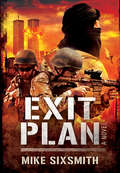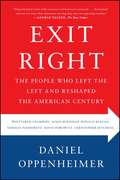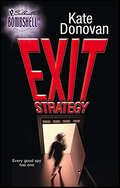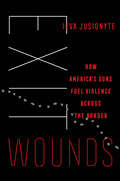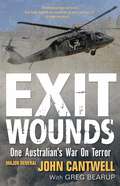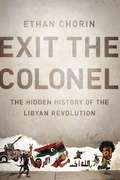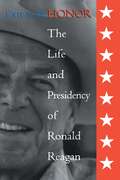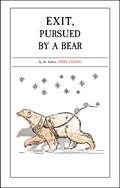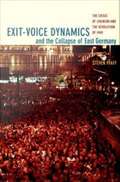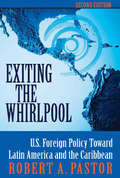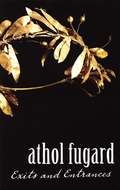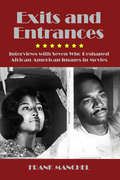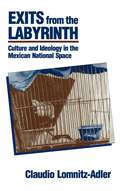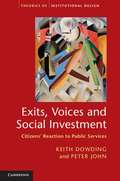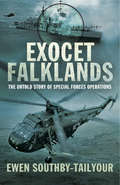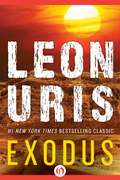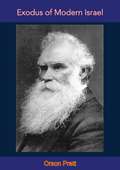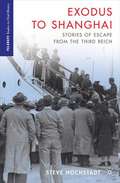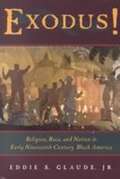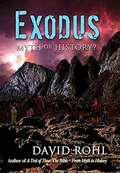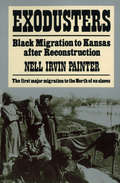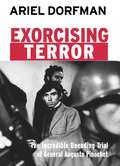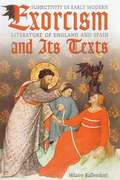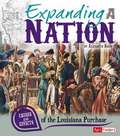- Table View
- List View
Exit Plan: A Novel
by Mike SixsmithBill Sloan, a former British Army intelligence officer and Shahid Al Sheehi, the son of a Pakistani British immigrant are caught up in a breathtakingly ambitious plan for a small Middle Eastern Emirate to seize regional power by acquiring weapons of mass destruction. The destinies of Sloan and Al Sheehi are irrevocably entwined.This novel draws the reader into a realm of political intrigue, characterized by thwarted terrorist plots, international duplicity, and a host of anxious preoccupations including the threat of WMDs. Incredibly timely, as these issues still continue to feature in contemporary headlines, this work acts to set our current perceptions of such issues is context.Well-developed characters populate the pages, living very different lives but influenced by similar factors; a writer in command of his subject matter details their parallel agendas and overlapping imperatives with ease. Informed by his own personal experiences, this novel has a real feel of authenticity, offering an unrivalled insight into the Middle Eastern tensions, which have simmered over the past thirty years, and seeking to illuminate the paradoxes and oppositions of lives ensnared in such realities.
Exit Right
by Daniel OppenheimerA provocative, intimate look at the evolution of America's political soul through the lives of six political figures--from Whittaker Chambers to Christopher Hitchens--who abandoned the left and joined the right.In Exit Right, Daniel Oppenheimer tells the stories of six major political figures whose journeys away from the left reshaped the contours of American politics in the twentieth century. By going deep into the minds of six apostates--Whittaker Chambers, James Burnham, Ronald Reagan, Norman Podhoretz, David Horowitz, and Christopher Hitchens--Oppenheimer offers an unusually intimate history of the American left, and the right's reaction. Oppenheimer is a brilliant new voice in political history who has woven together the past century's most important movements into a single book that reveals the roots of American politics. Through the eyes of his six subjects, we see America grow, stumble, and forge ahead--from World War I up through the Great Depression and World War II, from the Red Scare up through the Civil Rights Movement, and from the birth of neoconservatism up through 9/11 and the dawn of the Iraq War. At its core, Exit Right is a book that asks profound questions about why and how we come to believe politically at all--on the left or the right. Each of these six lives challenges us to ask where our own beliefs come from, and what it might take to change them. At a time of sky-high partisanship, Oppenheimer breaks down the boundaries that divide us and investigates the deeper origins of our politics. This is a book that will resonate with readers on the left and the right--as well as those stuck somewhere in the middle.
Exit Strategy
by Kate DonovanRookie agent Miranda Cutler had looked up to superspy Ray Ortega.Her thanks? He'd seduced her, then left her holding the bag for an ill-fated op that nearly ruined her career while he went into selfimposed exile. One year later, the CIA wanted Miranda to lure Ortega back for a mission so risky, they said only he could handle it.Miranda had a better idea. She would infiltrate the militant group suspected of creating a dangerous new weapon, salvaging her career and ridding herself of Ortega's ghost in one burst of glory. Her assignment to approach Ortega gave her a way in. But nothing could prepare Miranda for what would happen when it was time to get out....
Exit Wounds: How America's Guns Fuel Violence across the Border (California Series in Public Anthropology #57)
by Ieva JusionyteTurns the familiar story of trafficking across the US-Mexico border on its head, looking at firearms smuggled south from the United States to Mexico and their ricochet effects. American guns have entangled the lives of people on both sides of the US-Mexico border in a vicious circle of violence. After treating wounded migrants and refugees seeking safety in the United States, anthropologist Ieva Jusionyte boldly embarked on a journey in the opposite direction—following the guns from dealers in Arizona and Texas to crime scenes in Mexico. An expert work of narrative nonfiction, Exit Wounds provides a rare, intimate look into the world of firearms trafficking and urges us to understand the effects of lax US gun laws abroad. Jusionyte masterfully weaves together the gripping stories of people who live and work with guns north and south of the border: a Mexican businessman who smuggles guns for protection, a teenage girl turned trained assassin, two US federal agents trying to stop gun traffickers, and a journalist who risks his life to report on organized crime. Based on years of fieldwork, Exit Wounds expands current debates about guns in America, grappling with US complicity in violence on both sides of the border.
Exit Wounds: One Australian's War On Terror: Updated Edition
by Greg Bearup Major General John CantwellJohn Cantwell, Queensland country boy, enlisted in the army as a private and rose to the rank of major general. He was on the front line in 1991 as Coalition forces fitted bulldozer blades to tanks and buried Iraqi troops alive. He served in Baghdad in 2006 and saw what a car bomb does to a crowded marketplace. He was commander of Australian forces in Afghanistan in 2010 when ten of his soldiers were killed. He came home in 2011 to be considered for the job of chief of the Australian Army. Instead, he ended up in a psychiatric hospital. Exit Wounds is the deeply human account of one man's tour of the War on Terror, the moving story of life on a modern battlefield: from the nightmare of cheating death in a field strewn with mines, to the utter despair of looking into the face of a dead soldier before sending his body home to his mother. Cantwell hid his post-traumatic stress disorder for decades, fearing it would affect his career. Australia has been at war for the past twenty years and yet there has been no stand-out account from these conflicts - Exit Wounds is it. Raw, candid and eye-opening, no one who reads this book will be unmoved.
Exit into History: A Journey Through the New Eastern Europe
by Eva Hoffman"Indispensable for anyone who wants to seriously come to grips with the experience of Eastern Europe. "-Cleveland Plain Dealer.
Exit the Colonel: The Hidden History of the Libyan Revolution
by Ethan ChorinInExit the Colonel, Ethan Chorin, a longtime Middle East scholar and one of the first American diplomats posted to Libya after the lifting of international sanctions, goes well beyond recent reporting on the Arab Spring to link the Libyan uprising to a flawed reform process, egregious human rights abuses, regional disparities, and inconsistent stories spun by Libya and the West to justify the Gaddafi regime's "rehabilitation. " Exit the Colonel is based upon extensive interviews with senior US, EU, and Libyanofficials, and with rebels and loyalists; a deep reading of local and international media; and significant on-the-ground experience pre- and post-revolution. The book provides rare and often startling glimpses into the strategies and machinations that brought Gaddafi in from the cold, while encouraging ordinary Libyans to "break the barrier of fear. " Chorin also assesses the possibilities and perils for Libya going forward, politically and economically.
Exit with Honor: The Life and Presidency of Ronald Reagan (The\right Wing In America Ser.)
by William E PembertonFew presidents have sparked as much interest in recent years as Ronald Reagan, already the subject of a large number of biographies and specialized subjects. This biography, based on recent research into the Reagan archives and synthesis of the large memoir literature, explores the shaping of his values and beliefs during his childhood in the American heartland, his leadership of the American conservative movement, and his successful political career culminating in the first two-term presidency since Dwight Eisenhower. Pemberton finds Reagan's personal career and ability to understand and communicate with the American people admirable, but finds many of the long-term effects of his presidency harmful.
Exit, Pursued by a Bear
by Greer GilmanHenry Stuart, heir to the British throne, is clever, handsome, a real hero. Unfortunately, he is also tone-deaf in his dealings with the Unseen World. Unbeknownst to him, his ambitious plans for a coming-of-age Faerie court masque have enraged his neighbor monarchs, Oberon and Titania. Seeking recompense, they assign the undead poet Kit Marlowe to bring them the heir.
Exit-Voice Dynamics and the Collapse of East Germany: The Crisis of Leninism and the Revolution of 1989
by Steven PfaffWinner of the Social Science History Association President's Book Award East Germany was the first domino to fall when the Soviet bloc began to collapse in 1989. Its topple was so swift and unusual that it caught many area specialists and social scientists off guard; they failed to recognize the instability of the Communist regime, much less its fatal vulnerability to popular revolt. In this volume, Steven Pfaff identifies the central mechanisms that propelled the extraordinary and surprisingly bloodless revolution within the German Democratic Republic (GDR). By developing a theory of how exit-voice dynamics affect collective action, Pfaff illuminates the processes that spurred mass demonstrations in the GDR, led to a peaceful surrender of power by the hard-line Leninist elite, and hastened German reunification. While most social scientific explanations of collective action posit that the option for citizens to emigrate--or exit--suppresses the organized voice of collective public protest by providing a lower-cost alternative to resistance, Pfaff argues that a different dynamic unfolded in East Germany. The mass exit of many citizens provided a focal point for protesters, igniting the insurgent voice of the revolution. Pfaff mines state and party records, police reports, samizdat, Church documents, and dissident manifestoes for his in-depth analysis not only of the genesis of local protest but also of the broader patterns of exit and voice across the entire GDR. Throughout his inquiry, Pfaff compares the East German rebellion with events occurring during the same period in other communist states, particularly Czechoslovakia, China, Poland, and Hungary. He suggests that a trigger from outside the political system--such as exit--is necessary to initiate popular mobilization against regimes with tightly centralized power and coercive surveillance.
Exiting The Whirlpool
by Robert PastorIn this second edition of Exiting the Whirlpool, Pastor explores the continuities and the changes in U.S. foreign policy toward Latin America under Presidents Carter, Reagan, Bush, and Clinton. Whereas many foreign policy volumes neglect the role of Congress, Pastor devotes an entire chapter to explaining how it has shaped policy. Next, he looks at the recurring challenges that have often pulled the United States into the destructive whirlpool-how the United States has tried but often failed to manage succession crises, pre-empt or undermine revolutionaries, promote or manipulate elections, and encourage or neglect the region's economic development. Pastor offers a series of far-reaching policy recommendations for exiting the whirlpool and forging a hemispheric community of democracies within a free trade area. The first edition was widely acclaimed. The second is thoroughly updated, offering analyses and recommendations for addressing the contemporary democratic and security challenges facing the hemisphere.
Exits and Entrances
by Athol Fugard Marianne Mcdonald"A rare playwright who could be a primary candidate for either the Nobel Prize in Literature or the Nobel Peace Prize."--The New YorkerThis new play about life and art by renowned playwright Athol Fugard is based on his early friendship with actor Andrew Huegonit, considered the finest classical actor of their native South Africa. It is the story of one great artist's exit from the stage and another's beginning theater career. Athol Fugard's work includes Blood Knot, "Master Harold"...and the boys, and My Children! My Africa! He has been widely produced in South Africa and London, on Broadway and across the United States.
Exits and Entrances: Interviews with Seven Who Reshaped African-American Images in Movies
by Frank Manchel“A worthy successor to Every Step a Struggle . . . the contributions to American cinema of these determined and courageous rebels will never be forgotten.” —Denise Youngblood, author ofCinematic Cold WarWhile Every Step a Struggle recalled the performers who fought to give black artists a voice and a presence in film and on stage, this new ground-breaking book focuses on the personalities who replaced the pioneers and refused to abide by Jim Crow traditions. Presented against a detailed background of the revolutionary post-World War II era up to the mid-1970s, the individual views of Mae Mercer, Brock Peters, Jim Brown, Ivan Dixon, James Whitmore, William Marshall and Ruby Dee in heretofore unpublished conversations from the past reveal just how tumultuous and extraordinary the technological, political, and social changes were for the artists and the film industry. Using extensive documentation, hundreds of films, and fascinating private recollections, Dr. Manchel puts a human face both on popular culture and race relations.“Using the method of oral history and the mature thinking of a senior scholar, Exits and Entrances enhances our understanding of the difficult slog to create a truthful, ‘round’ image of African-Americans in U.S. commercial films. This collection is a gold mine of information for future research and should be in all libraries which value film research.” —Peter C. Rollins, Emeritus Editor-in-Chief of Film & History
Exits from the Labyrinth: Culture and Ideology in the Mexican National Space
by Claudio Lomnitz-AdlerCan we address the issue of nationalism without polemics and restore it to the domain of social science? Claudio Lomnitz-Adler takes a major step in that direction by applying anthropological tools to the study of national culture. His sweeping and innovative interpretation of Mexican national ideology constructs an entirely new theoretical framework for the study of national and regional cultures everywhere. With an analysis of culture and ideology in internally differentiated regional spaces—in this case Morelos and the Huasteca in Mexico—Exits from the Labyrinth links rich ethnographic and historical research to two specific aspects of Mexican national ideology and culture: the history of legitimacy and charisma in Mexican politics, and the relationship between the national community and racial ideology.
Exits, Voices and Social Investment
by Keith Dowding Peter JohnOver fifty years ago Albert Hirschman argued that dissatisfied consumers could either voice complaint, or exit when they were dissatisfied with goods or services. Loyal consumers would voice rather than exit. Hirschman argued that making exit easier from publicly provided services, such as health or education, would reduce voice, taking the richest and most articulate away and this would lead to the deterioration of public services. This book provides the first thorough empirical study of these ideas. Using a modified version of Hirschman's account, examining private and collective voice and viewing loyalty as a form of social investment, it is grounded on a dedicated five-year panel study of British citizens. Given government policies over the past decade or more which make exit easier from public providers, this is a timely publication for all those who care about the quality of government services.
Exocet Falklands: The Untold Story of Special Forces Operations
by Ewen Southby-Tailyour&“A fascinating account of three SAS missions to counter the Exocet missile . . . from ill-thought out ideas to near suicidal one-way trips onto enemy soil.&”—Soldier Magazine This is a revelatory account of three un-tabulated special forces operations, PLUM DUFF, MIKADO and KETTLEDRUM, that were tasked to destroy Argentina&’s Exocet missiles during the 1982 Falkland&’s campaign. Interviews with the SAS officer commanding Operation PLUM DUFF, members of the reconnaissance patrol for Operation MIKADO, plus the navigator of the helicopter that flew eight troopers into Tierra del Fuego, has allowed the author to describe the tortuous events that led, instead, to a significant survival story. The RAF pilots ordered to conduct an &“assault-landing&” of two Hercules onto Rio Grande air base during Operation MIKADO have spoken of the extraordinary procedures they developed: so have the commander of the SBS and the captain of the British submarine involved in Operation KETTLEDRUM. The Super Étendard pilots who sank HMS Sheffield and MV Atlantic Conveyor and then &“attacked&” HMS Invincible, plus a key member of the Argentine special forces and the brigadier defending Rio Grande, add credence, depth and gravitas to the saga: as does an equally revealing interview with the SIS (MI6) officer who led the world-wide search for Exocets on the black market. Disturbing over-confidence by commanders at home was finely counter-balanced by stirring accounts of inspiring physical and moral courage across the South Atlantic. Exocet Falklands is a ground-breaking work of investigative military history from which many salutary lessons can be learned. &“Between politics, diplomacy and barbouzeries, this well-documented work will lead you in the arcane of what should have changed the course of this war.&”—Air Fan
Exodus
by Leon UrisThe epic saga of Israel's earliest days and the people who fought to make it their home The Exodus was just one ship among many that carried survivors of the Holocaust to Palestine to establish a new nation. But the path that Jewish immigrants took to enter British-controlled Palestine was a difficult one, fraught with danger and political intrigue. The boat was intercepted by British forces and the refugees were placed in concentration camps. Uris's blockbuster novel traces the lives of the men and women who brave British naval blockades to help Israel come into being, from Ari Ben Canaan, who works tirelessly to smuggle in settlers, to Kitty Fremont, an American nurse drawn into a vast, tragic history. Weaving together fact and fiction, history and dramatic storylines, Exodus stands today as one of the most influential narratives of the founding of the State of Israel. This ebook features an illustrated biography of Leon Uris including rare photos from the author's estate.
Exodus of Modern Israel: Being The Daily Diary Of Orson Pratt
by Orson PrattThis book, which was first published in 1947, is the daily diary of Orson Pratt on the exodus of the Latter-Day Saints from Nauvoo, Illinois to the Rocky Mountains in Colorado. It also contains detailed information on plans instituted by the Prophet Joseph Smith for this Exodus, as related by Anson Call, Wilford Woodruff, Brigham Young, Historian Edward W. Tullidge, Samuel W. Richards, Helen Mar Whitney, and by Joseph the Prophet himself.
Exodus to Shanghai
by Steve HochstadtOf the 400,000 German-speaking Jews that escaped the Third Reich, about 16,000 ended up in Shanghai, China. This groundbreaking volume gathers 20 years of interviews with over 100 former Shanghai refugees. It offers a moving collective portrait of courage, culture shock, persistence, and enduring hope in the face of unimaginable hardships.
Exodus!: Religion, Race, and Nation in Early Nineteenth-Century Black America
by Jr. Eddie S. GlaudeNo other story in the Bible has fired the imagination of African Americans quite like that of Exodus. Its tale of suffering and the journey to redemption offered hope and a sense of possibility to people facing seemingly insurmountable evil. "Exodus!" shows how this biblical story inspired a pragmatic tradition of racial advocacy among African Americans in the early 19th century - a tradition based not on race but on a moral politics of respectability. <p><p> Eddie S. Glaude, Jr., begins by comparing the historical uses of Exodus by black and white Americans and the concepts of "nation" it generated. He then traces the roles that Exodus played in the National Negro Convention movement, from its first meeting in 1830 to 1843, when the convention decided - by one vote - against supporting Henry Highland Garnet's call for slave insurrection. <p><p> "Exodus!" reveals the deep historical roots of debates over African-American national identity that continue to rage today. It should engage anyone interested in the story of black nationalism and the promise of African-American religious culture.
Exodus: Myth or History
by David M. RohlDavid Rohl's latest book, now on Kindle, reveals the true archaeological history of the biblical stories – the Israelite Sojurn in Egypt beginning with Joseph, the Exodus under the leadership of Moses, and the Conquest of the Promisede Land led by Joshua. The site of Israel's bondage in Goshen is uncovered; the route of the Exodus is explained in great detail; and the walls of Jericho that 'fell down flat' are exposed. <p><p> This book is richly illustrated in full colour, with photos, charts, and maps to help the reader understand and appreciate the evidence that confirms the historical accuracy of the greatest events in the Old Testament narratives. As one newspaper declared, 'the Bible is back in business!'
Exodusters: Black Migration to Kansas After Reconstruction
by Nell Irvin PainterThe first major migration to the North of ex-slaves.
Exorcising Terror: The Incredible Unending Trial of General Augusto Pinochet (Open Media Series)
by Ariel DorfmanRenowned author Ariel Dorfman, obsessed for twenty-five years with the malignant shadow General Pinochet cast upon Chile and the world, followed every twist and turn of the four year old trial in Great Britain, Spain and Chile as well as in the U.S., the country that had created Pinochet. Told as a suspense thriller, filled with court-room drama and sudden reversals of fortune, the book at the same time addresses some of today's most burning issues, made all the more urgent after the terrorist attacks of September 11th 2001. What are the limits of national sovereignty in a globalizing world? How does an ever more interconnected world judge crimes committed against humanity? What role do memory and pain and the rights of the survivors play in this struggle for a new system of justice? But above all, the author, by listening carefully to the voices of Pinochet's many victims, explores how can we purge ourselves of terror and fear once we have been traumatized, and asks if we can build peace and reconciliation without facing a turbulent and perverse past.
Exorcism and Its Texts: Subjectivity in Early Modern Literature of England and Spain (The Royal Society of Canada Special Publications)
by Hilaire KallendorfExorcism and demonic possession appear as recurrent motifs in early modern Spanish and English literatures. In Exorcism and Its Texts, Hilaire Kallendorf demonstrates how this 'infection' was represented in some thirty works of literature by fifteen different authors, ranging from canonical classics like Shakespeare, Cervantes, Ben Jonson, and Lope de Vega, to obscure works by anonymous writers. From comic and tragic drama to picaresque narrative and eight other genres, possession worked as a paradigm through which authors could convey extraordinary experience, including not only demonic possession but also madness or even murder. The devil was thought to be able to enter the bodily organs and infect memory, imagination, and reason. Some came to believe that possession was tied to enthusiasm, poetic frenzy, prophecy, and genius. Authors often drew upon sensational details of actual exorcisms. In some cases, such as in Shakespeare, curing the body (and the body politic) meant affirming cultural authority; in others, as with Zamora, it clearly meant subverting it. Drawing on the disciplines of literary theory and history, Exorcism and its Texts is the first comprehensive study of this compelling topic.
Expanding A Nation: Causes And Effects Of The Louisiana Purchase (Cause And Effect Series)
by Elizabeth RaumIn 1803 the United States was still a small, young country. Just 17 states made up the Union, stretching from the Atlantic coast to the Mississippi River. European countries claimed the rest of the land in North America.
